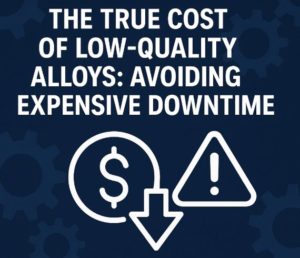The True Cost of Low-Quality Alloys: Avoiding Expensive Downtime
In today’s industrial world, system reliability isn’t optional — it’s a requirement.
Whether you’re managing a chemical plant, paper mill, refinery, or offshore operation, downtime is expensive. One overlooked gasket, under-spec valve, or cheap pipe fitting can set off a chain of events that stalls production, risks safety, and derails your maintenance budget.
Unfortunately, one of the most common causes of these failures is the use of low-quality alloys — materials that simply don’t hold up under pressure, corrosion, or time.
At PM International, we’ve seen firsthand what happens when companies prioritize short-term price over long-term value. And we’ve also seen the massive savings that come from choosing the right material the first time.
What Makes an Alloy “Low-Quality”?
Not all metal that shows up with a price quote is ready for real-world performance. “Low-quality” alloys typically have one or more of the following issues:
– Failure to meet industry standards, including ASTM, EN, NORSOK, or ASME specs
– Inconsistent chemistry — often seen in bargain-grade imports
– Falsified or missing MTRs (Mill Test Reports), leaving traceability and performance uncertain
– Poor mechanical properties, like lower-than-expected yield strength or ductility
– Lack of heat treatment or pressure rating documentation
Even if the invoice says “316L stainless,” for example, the actual performance could be far below spec — especially when that metal is exposed to chlorides, acids, velocity, or pressure cycling.
Where Low-Quality Alloys Cause the Most Damage
Failures typically show up in areas exposed to aggressive conditions or mechanical stress. Here’s where our clients most often see early failures:
Valves and Fittings
- Pitting corrosion, seal failure, and internal erosion from flow and turbulence
- Cracking due to thermal expansion or chemical exposure
Pipe Systems
- Wall loss due to acidic or chlorinated fluids
- Stress corrosion cracking or embrittlement under pressure
- Misalignment or fatigue from inconsistent material strength
Flanges and Fasteners
- Galling, thread failure, or permanent deformation
- Leak paths from uneven pressure or corrosion between dissimilar metals
Marine and Coastal Applications
- Galvanic corrosion due to alloy mismatch in seawater systems
- Biofouling and metal fatigue on submersible parts
The Real Cost of Downtime
Using low-cost, low-quality alloys doesn’t just risk early failure — it directly translates into major financial losses when things go wrong.
Here’s what downtime can cost:
- Production Loss: $10,000 to $250,000+ per hour, depending on your plant’s size
- Emergency Labor: Overtime, call-outs, and fast-track installations
- Expedited Shipping: Rush delivery of replacements, often at a premium
- Compliance Risk: EPA, OSHA, or customer violations tied to equipment failure
- Reputation Damage: Lost contracts, missed delivery windows, or internal credibility loss
According to a study in Corrosion Reviews, 20–30% of all unplanned downtime in processing industries can be traced back to materials selection failures. (Source)
How to Avoid Material Selection Mistakes
Procurement and engineering teams can avoid these pitfalls with a few best practices:
✅ Verify the Specs: Always ask for ASTM, EN, or NORSOK compliance based on your application.
✅ Review the MTRs: Require documentation for heat treatment, mechanical properties, and chemical composition.
✅ Avoid Mixing Metals Blindly: Consider galvanic compatibility in marine or chemical settings.
✅ Work With a Trusted Supplier: Choose a partner who knows what works in the field — not just what’s in stock.
Why PM International Gets It Right
PM International is a trusted partner to some of the world’s most demanding industries, including:
– Chemical processing
– Pulp & paper
– Marine and offshore
– Power generation
– Mining and heavy industrial
We supply titanium (Grades 2 & 12), copper nickel (90/10 & 70/30), aluminum bronze, and other specialty alloys that are spec-compliant, traceable, and proven in the field.
With PM, you get:
– Mill test reports and certifications on every order
– Fast, responsive quotes and global fulfillment
– Guidance from technical experts who know where materials fail — and how to prevent it
Final Thoughts: The Right Material Is Worth It
Choosing the wrong alloy might save money today — but it often leads to failures, finger-pointing, and five-figure repair bills tomorrow.
At PM International, we help engineering and procurement teams make smart material decisions that reduce risk, avoid downtime, and increase ROI.
👉 Request a Quote or speak to a materials specialist today




